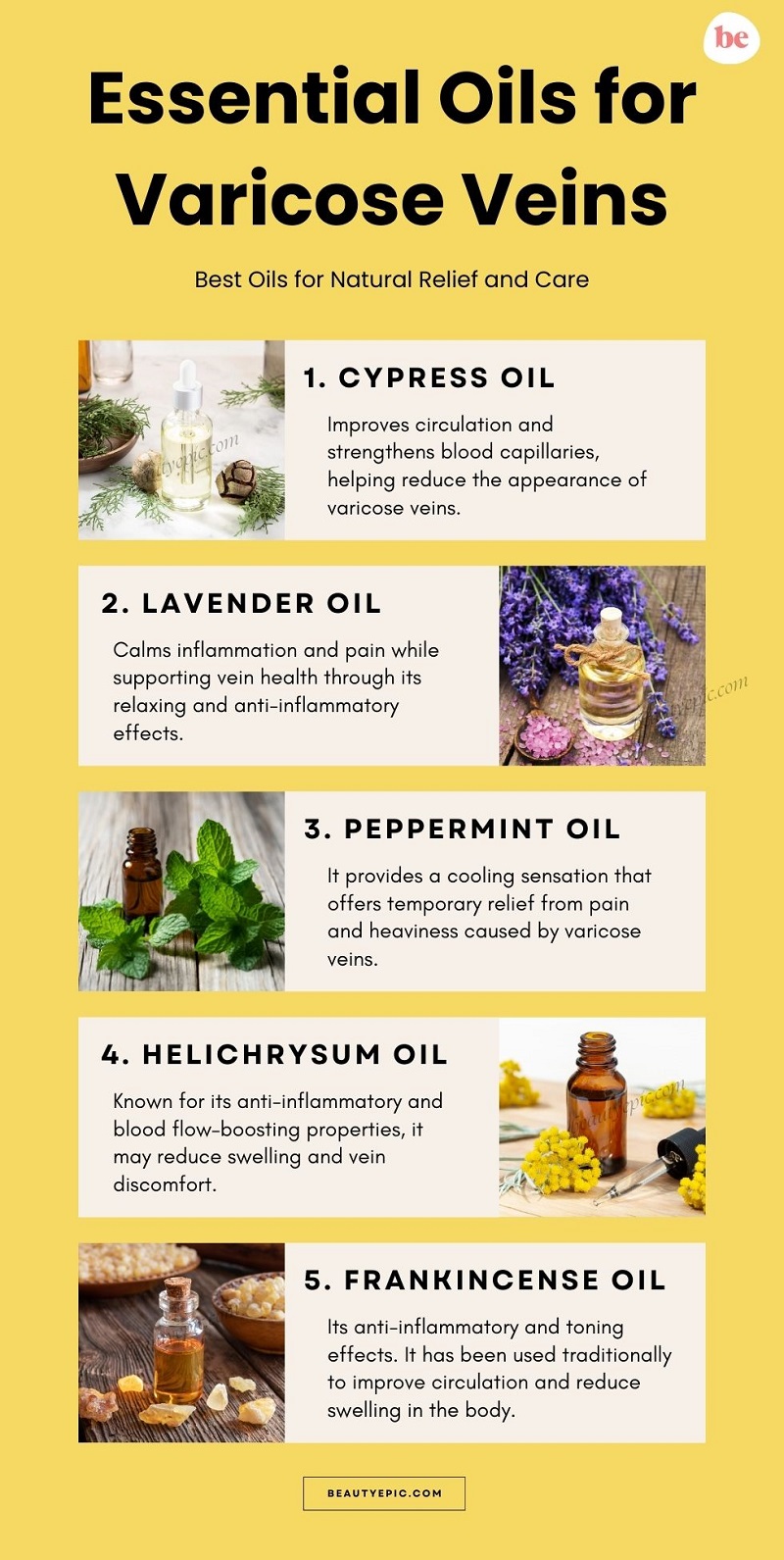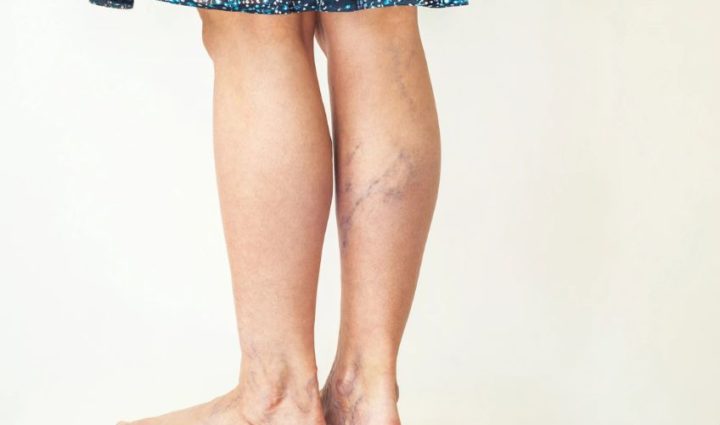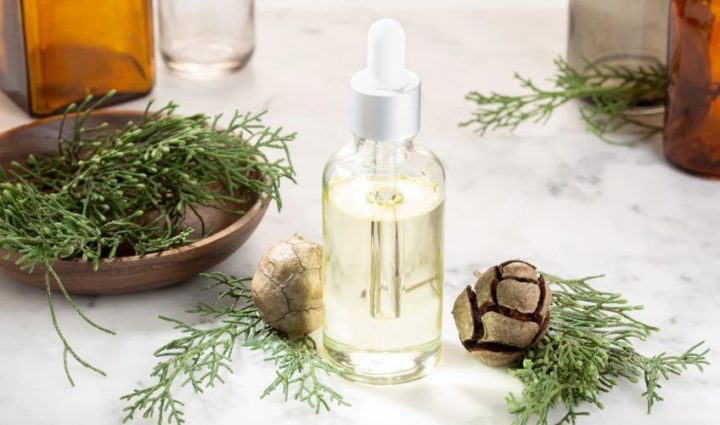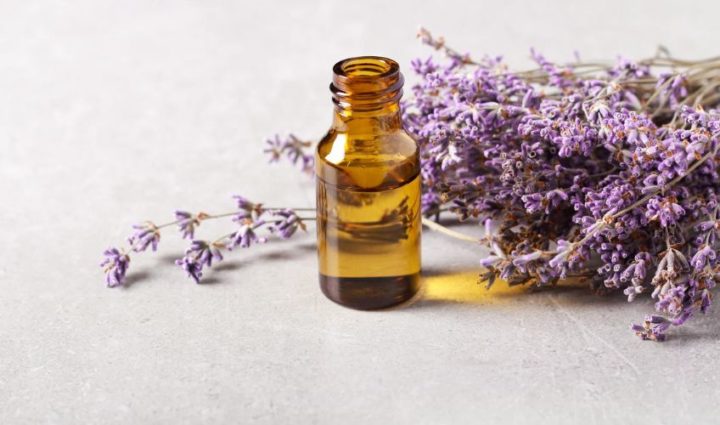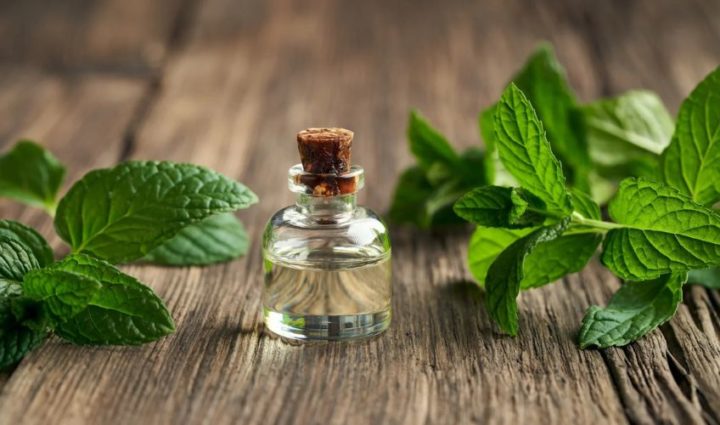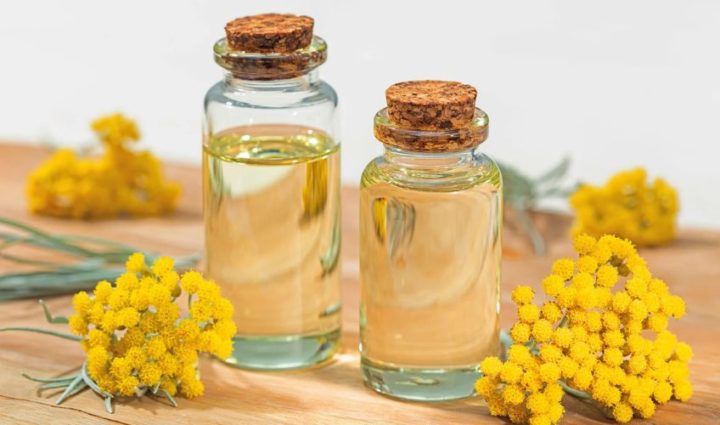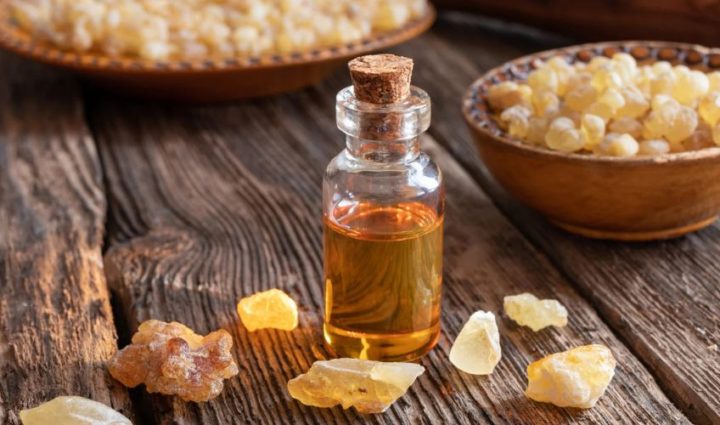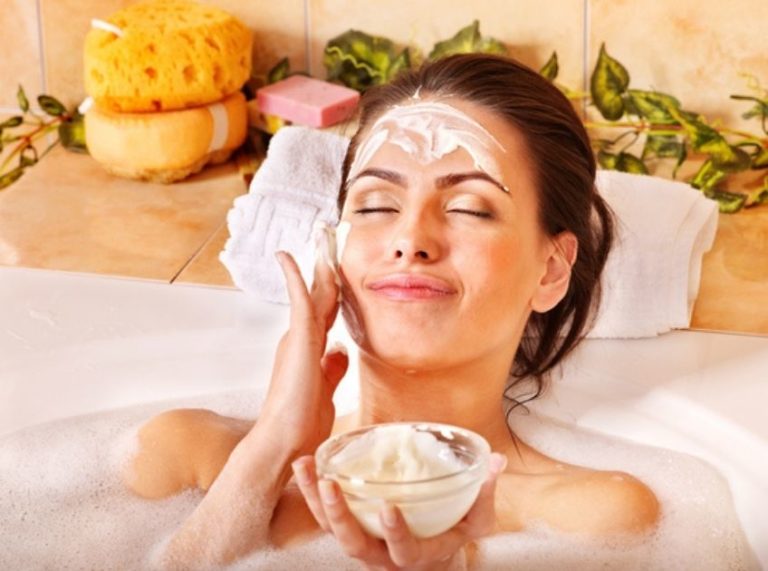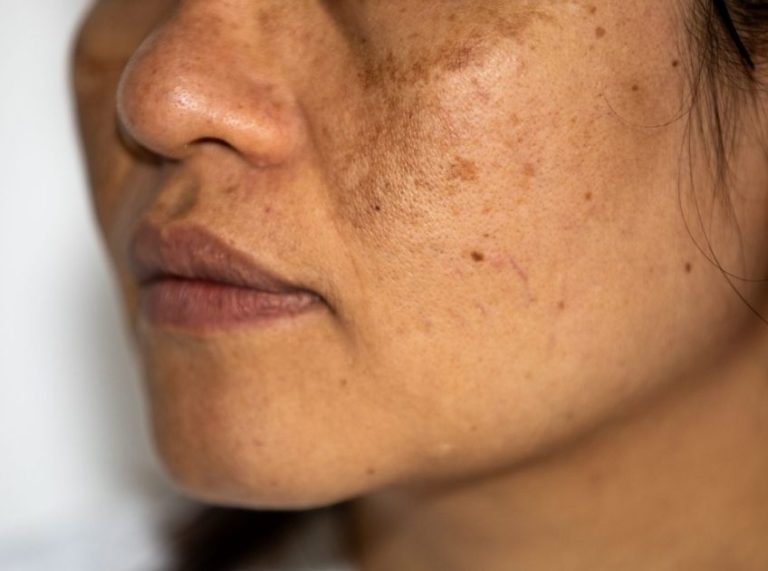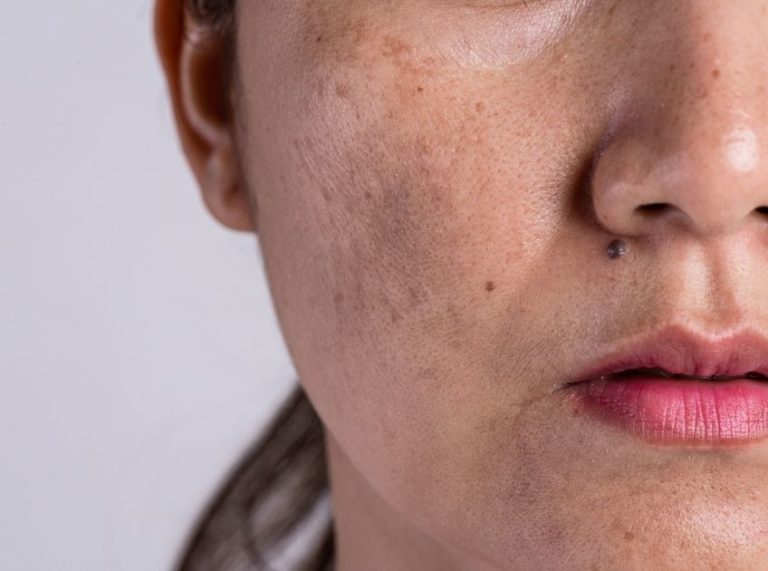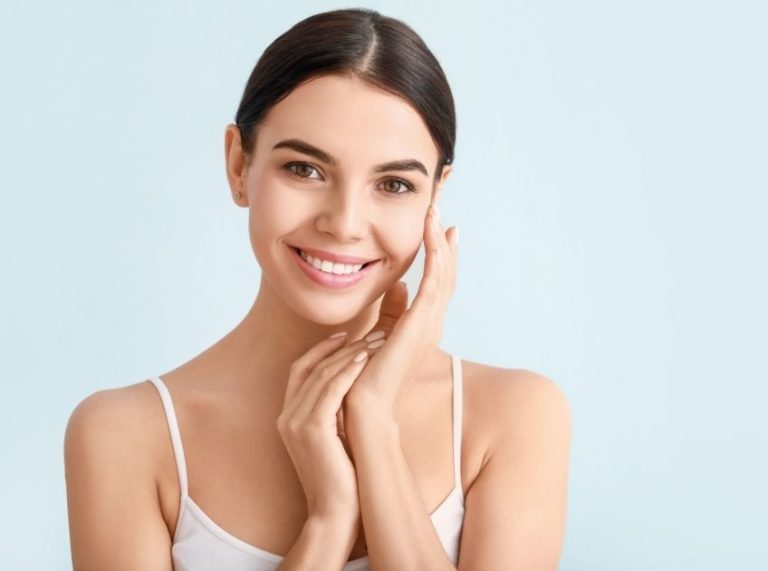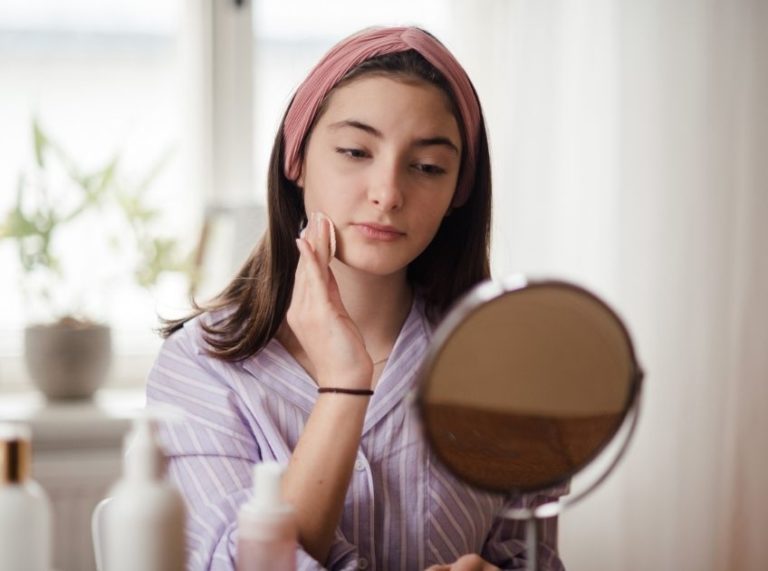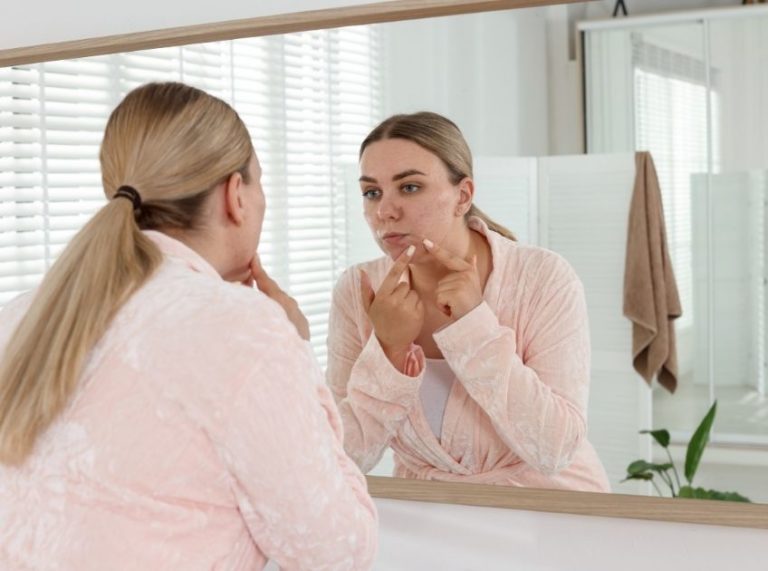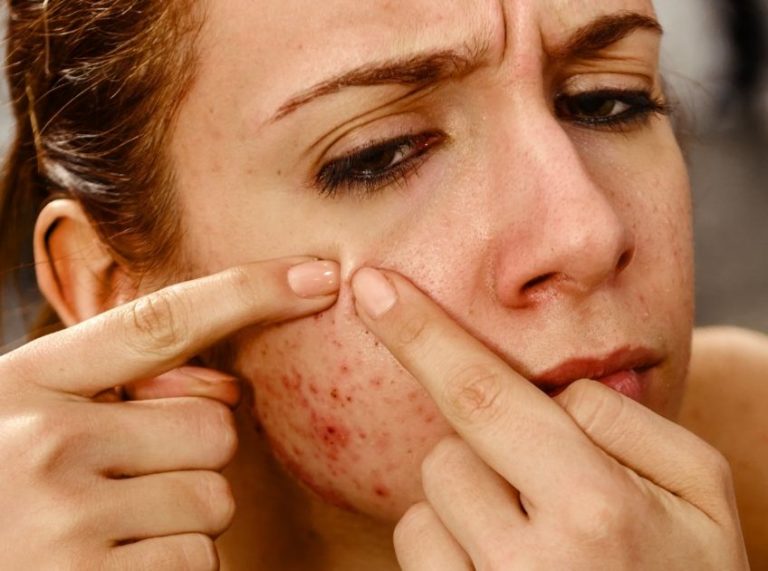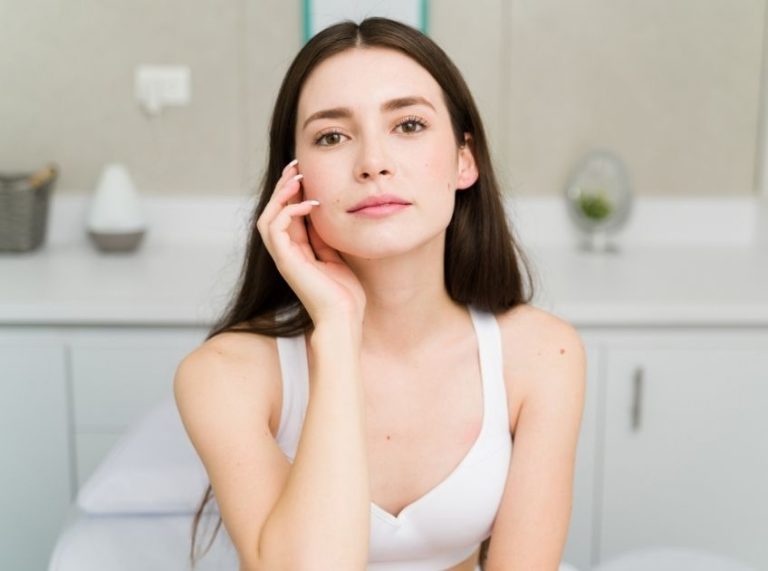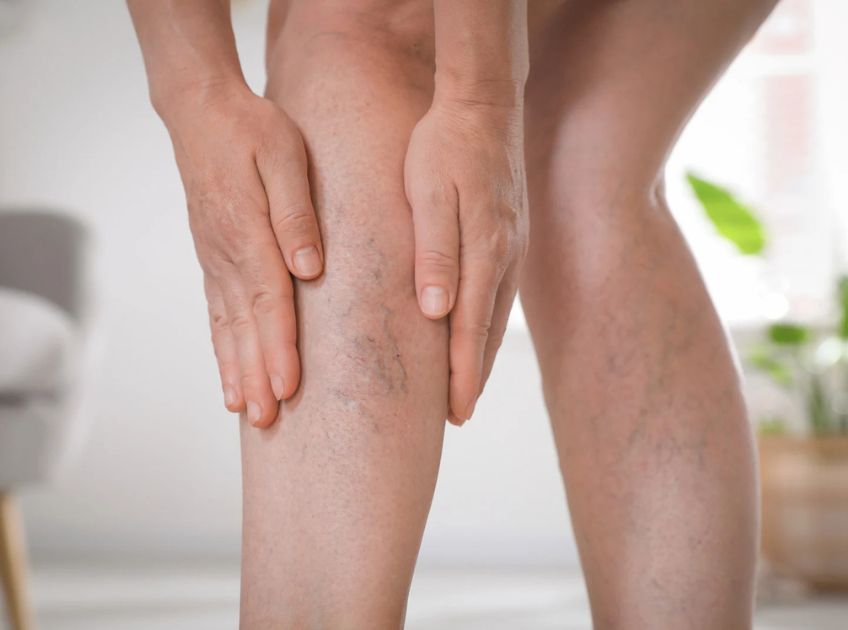
Important: This article is for informational purposes only. Please read our full disclaimer for more details.
Varicose veins are more than just a cosmetic concern. These enlarged, twisted veins—often appearing on the legs—occur when blood pools due to weakened vein walls or faulty valves. While not always serious, they can cause discomfort, swelling, aching, and heaviness in the legs.
Millions of people, particularly women and older adults, deal with varicose veins, leading many to explore natural remedies like essential oils alongside conventional treatments.
Article Contains
- Why Do Varicose Veins Develop?
- The 5 Best Essential Oils for Varicose Veins
- Quick Safety Notes for All Essential Oils
- Other Treatment Options Worth Considering
- Medical Treatments and Procedures
- When to See a Doctor
- Lifestyle Habits That Help Prevent Varicose Veins
- Safety First: Risks of Essential Oils
- What Science Says About Essential Oils for Varicose Veins
Why Do Varicose Veins Develop?
The main cause of varicose veins is poor blood circulation. Veins rely on valves to push blood back toward the heart. When these valves weaken, blood flows backward and collects, causing veins to stretch and bulge.
Common risk factors include:
- Genetics
- Prolonged standing or sitting
- Pregnancy
- Obesity
- Aging
- Hormonal changes
Understanding the root cause helps in choosing the right remedies and preventive measures.
The 5 Best Essential Oils for Varicose Veins
Essential oils cannot cure varicose veins, but they can offer significant relief from symptoms like swelling, pain, and heaviness in the legs. Here’s a deeper look at the top five oils recommended for circulation and vein support.
1. Cypress Oil: The Circulation Booster
Cypress essential oil is one of the most frequently recommended oils for varicose veins (1). Traditionally used in herbal medicine for circulation problems, it is believed to help stimulate blood flow and strengthen vein walls.
Why it helps
- Acts as a natural vasoconstrictor, which may tighten and tone vein walls.
- Reduces fluid retention, making it useful for swollen legs.
- Improves circulation, helping blood flow more efficiently.
How to use it
- Dilute 3–4 drops of cypress oil in a teaspoon of carrier oil (like almond or jojoba oil).
- Massage gently in upward strokes toward the heart to encourage blood flow.
- Can also be added to a warm bath for relaxation and circulation support.
Extra tip: Pairing cypress with lavender oil can enhance its soothing effect.
2. Lavender Oil: The Pain and Inflammation Reliever
Lavender oil is one of the most versatile essential oils, famous for its anti-inflammatory, calming, and analgesic (pain-relieving) effects (2). For varicose veins, it helps with reducing pain, swelling, and muscle tension.
Why it helps
- Reduces inflammation around swollen veins.
- Soothes pain and heaviness in the legs.
- Promotes relaxation and better sleep, which indirectly supports healing.
How to use it
- Mix a few drops with coconut oil and gently massage onto the legs.
- Add to an evening bath to ease tension and improve circulation.
- Combine with cypress or helichrysum for a targeted blend.
Extra tip: Lavender is one of the gentlest oils, making it safe for most skin types when diluted properly.
3. Peppermint Oil: The Cooling Comfort
Peppermint essential oil is refreshing and invigorating, thanks to its high menthol content (3). It provides a cooling sensation that offers temporary relief from pain and heaviness caused by varicose veins (4).
Why it helps
- Acts as a mild anesthetic, dulling discomfort.
- Reduces swelling by soothing inflamed tissues.
- Energizes tired, achy legs after long periods of standing or sitting.
How to use it
- Mix 2–3 drops of peppermint oil with a carrier oil and massage onto affected areas.
- Use sparingly; peppermint oil is strong and can cause a tingling sensation.
- A cold compress with peppermint oil can also bring quick relief.
Extra tip: Avoid using peppermint oil close to bedtime as its energizing effects may make it harder to sleep.
4. Helichrysum Oil: The Tissue Healer
Helichrysum essential oil, sometimes called “immortelle” or “everlasting,” is prized for its regenerative properties. Though more expensive than other oils, it’s considered highly effective for supporting circulation and tissue repair (5).
Why it helps
- May reduce swelling and inflammation in veins.
- Promotes new cell growth and tissue regeneration.
- Improves circulation and strengthens vein walls.
How to use it
- Blend 2–3 drops with a carrier oil and massage gently on varicose veins.
- Mix with lavender and cypress for a powerful circulation blend.
Extra tip: Helichrysum is often used in luxury skincare products for its ability to support skin healing—making it a two-in-one option for vein health and skin improvement.
5. Frankincense Oil: The Vein Soother
Frankincense essential oil is known for its anti-inflammatory and toning effects. It has been used traditionally to improve circulation and reduce swelling in the body (6).
Why it helps
- Tones and strengthens blood vessels.
- Reduces inflammation and discomfort.
- Provides stress-relieving effects, which benefit circulation.
How to use it
- Mix 3–4 drops in a carrier oil and massage into affected areas.
- Use in aromatherapy diffusers to ease stress, which can indirectly support healthy circulation.
Extra tip: Frankincense pairs well with peppermint for pain relief or with lavender for calming effects.
Quick Safety Notes for All Essential Oils
- Always dilute essential oils before applying them to the skin. A safe ratio is 3–4 drops of essential oil per teaspoon of carrier oil.
- Perform a patch test before first use to check for skin reactions.
- Never apply oils to open wounds or broken skin.
- Avoid direct sun exposure after applying citrus-based oils (though not in this list).
- Pregnant or breastfeeding women should consult a doctor before use.
Other Treatment Options Worth Considering
Essential oils can help reduce discomfort from varicose veins, but they are only one part of a larger management strategy. Depending on the severity of your symptoms, lifestyle changes, home remedies, and medical procedures may all play an important role.
1. Compression Therapy
Wearing compression stockings is one of the most effective non-invasive methods for managing varicose veins. These specially designed socks or tights apply gentle pressure to your legs, helping veins and leg muscles move blood more efficiently.
- They reduce swelling, aching, and heaviness.
- They are available in different compression strengths—mild, moderate, or firm.
- For best results, they should be worn during the day, especially when standing or sitting for long hours.
A doctor can recommend the right compression level based on your condition.
2. Lifestyle Adjustments
Since poor circulation is at the heart of varicose veins, making daily lifestyle changes can go a long way in managing symptoms.
- Exercise regularly: Walking, swimming, and yoga improve blood flow and strengthen leg muscles.
- Avoid prolonged sitting or standing: Take short breaks to stretch and move around.
- Elevate your legs: Resting with legs elevated above heart level reduces pressure in the veins.
- Maintain a healthy weight: Extra weight puts more stress on your leg veins.
- Wear loose clothing: Tight garments can restrict circulation.
Even small changes in daily habits can provide noticeable relief over time.
3. Dietary Support
What you eat also impacts vein health. Certain foods and nutrients help strengthen blood vessels and reduce inflammation.
- High-fiber foods: Whole grains, fruits, and vegetables prevent constipation, which reduces abdominal pressure that worsens varicose veins.
- Flavonoid-rich foods: Berries, citrus fruits, leafy greens, and onions may improve circulation and lower blood pressure.
- Hydration: Drinking enough water helps maintain proper blood flow.
- Limit salt: Too much sodium can lead to water retention and swelling in the legs.
Supplements like horse chestnut extract or diosmin are sometimes recommended, but these should only be taken under medical supervision.
Medical Treatments and Procedures
If varicose veins are painful, worsening, or leading to complications, professional treatments may be necessary. Modern medical options are minimally invasive and highly effective:
- Sclerotherapy: A solution is injected into the vein, causing it to collapse and eventually fade.
- Laser therapy: High-intensity light closes off smaller varicose veins and spider veins.
- Radiofrequency ablation (RFA): Heat from radio waves seals the vein shut.
- Endovenous laser treatment (EVLT): A laser fiber is inserted into the vein to close it from within.
- Vein stripping and ligation: A surgical option for severe cases where large veins are removed.
These procedures are usually outpatient, meaning patients can return home the same day. A vascular specialist can determine which treatment is most appropriate.
When to See a Doctor
While home remedies and essential oils may help manage symptoms, medical attention is necessary if you experience:
- Persistent pain or swelling
- Skin discoloration or thickening around the vein
- Bleeding veins
- Open sores or ulcers on the legs
- Signs of blood clots, such as sudden swelling, warmth, or redness in one leg
Seeking timely medical advice ensures you avoid complications and find the most effective treatment plan.
Lifestyle Habits That Help Prevent Varicose Veins
Prevention is always better than cure. To lower your risk:
- Stay physically active—walking and stretching encourage healthy blood flow.
- Avoid standing or sitting for long periods without moving.
- Elevate your legs when resting.
- Wear supportive stockings if recommended.
- Maintain a healthy weight to reduce pressure on leg veins.
Safety First: Risks of Essential Oils
Essential oils are powerful, concentrated extracts. Using them incorrectly can lead to:
- Skin irritation or allergic reactions
- Photosensitivity (especially with citrus oils)
- Interference with medications in rare cases
Important: Never ingest essential oils for varicose veins. Always do a patch test before topical use and consult a healthcare provider, especially if pregnant, nursing, or managing other health conditions.
What Science Says About Essential Oils for Varicose Veins
Scientific research on essential oils and varicose veins is still limited. However:
- Studies show lavender and peppermint oils have anti-inflammatory and analgesic properties (7).
- Cypress oil has been traditionally used to improve circulation, though clinical evidence is still emerging (8).
- Essential oils are best viewed as complementary remedies that provide symptomatic relief, not cures (9).
Frequently Asked Questions (FAQ’S)
1. Can essential oils make varicose veins disappear?
A. No. Essential oils may reduce discomfort and swelling, but they cannot eliminate varicose veins. Medical treatments are needed for permanent removal.
2. How often should I use essential oils for varicose veins?
A. You can safely massage diluted oils onto affected areas once daily or a few times per week, depending on skin tolerance.
3. Are essential oils safe during pregnancy for varicose veins?
A. Pregnant women should consult a doctor before using essential oils, as some oils may not be safe during pregnancy. Compression stockings and lifestyle adjustments are usually recommended first.
Final Thoughts
Essential oils like cypress, lavender, and peppermint can offer soothing relief for the discomfort of varicose veins. When used correctly, they may reduce swelling, ease heaviness, and support circulation. Still, they are not a substitute for medical treatment.
If varicose veins are painful, worsening, or interfering with daily life, consult a healthcare provider. A combination of medical treatments, lifestyle changes, and natural remedies like essential oils can provide the best approach to managing this common condition.
